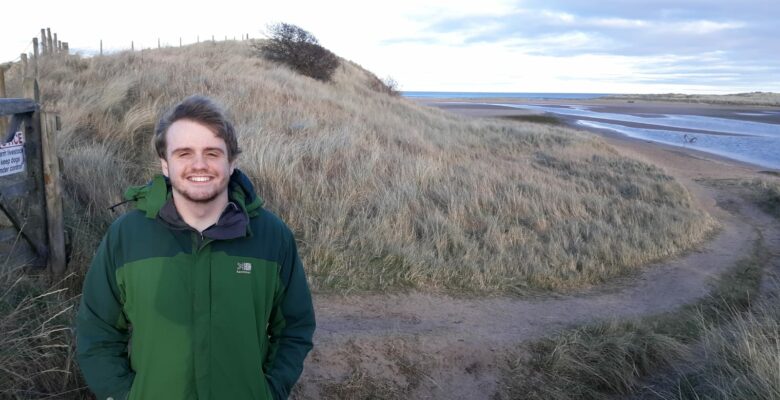As part of our ‘Meet the Team’ blog series, hear personally from our team members about their roles at EcoNorth and more. Today, meet Sam, one of our Assistant Ecologists.
Tell us a bit about yourself
Born and raised in Newcastle, I’m 24 years old and recently wrapped up my master’s degree at Newcastle University in (quite fittingly) ecological consultancy. I completed my undergraduate degree at the University of Manchester 2016-2020, with a year out in Tsukuba, Japan. Outside of work, I enjoy gaming, podcasts and keeping up my languages, mostly French and Japanese. I also love to do karaoke and am always trying to arrange the next session with my friends – my music taste is all over the place so the songs can be anything from AC/DC to Carly Rae Jepsen!
Summarise your role at EcoNorth
Since starting at EcoNorth back in October as a Graduate Ecologist, I have been involved in a variety of work supporting colleagues on large projects and even managing my own smaller scale projects under supervision. Out in the field, I assist on species-specific surveys, habitat walkovers and ECoW. In the office, I carry out desk studies to inform survey data, work on GIS mapping, and write up reports summarising the findings of surveys for clients in a concise and comprehensible manner. My role has given me the opportunity to utilise many of the skills learned from my master’s degree and previous summer work as a Field Ecologist while allowing me to develop new skills and try new things in the world of ecology. I have just been promoted to the role of Assistant Ecologist and am looking forward to the new challenges and experiences this will offer.
What got you into Ecology?
I sort of stumbled into it to be honest! I picked my undergraduate degree on the basis of enjoying what I was doing at A level (science and languages) and, during my studies, found myself gravitating towards ecology-themed modules and topics. I also learned of the vulnerability of the natural world to human activity and climate change, and the importance of protecting ecosystems and biodiversity. When I was younger, my parents frequently took me to wildlife sites, nature reserves and other green spaces, and it hit me during this time that I wanted to make sure future generations had similar spaces to enjoy. After graduating and a year out while COVID was at large, I decided I needed more practical skills to get a job I wanted and, after some research, found the masters course.
What do you like most about working as an Ecological Consultant?
I love the treasure trove of random fun facts you pick up and learning something new all the time. Everyone at EcoNorth has so much knowledge about species and sites that every day is a school day. Also, whenever I manage to identify a tricky plant in the field or successfully key it out at my desk with a sample and a field guide, I really enjoy the problem-solving aspect of this and the joy that comes with independently working out the species.
Describe the project you have worked on that you are proudest of. What did you do that worked out particularly well?
It’s still early days for my time in ecology and at EcoNorth, but one of the first projects I worked on brought together a lot of aspects of the job. I helped carry out a walkover of the project site including a preliminary bat roost assessment and habitat survey. I took the data from this survey, collated it together with information from the desk study, and mapped the habitats using GIS. Using this information, I was able to produce a net gain scenario for the site via the biodiversity net gain metric and also determine the probability of roosting bats within the buildings on site. I presented my findings in the draft report, which I then adjusted based on feedback in the review process. The experience took me through the whole project process for the first time, from preparing a quote to delivering the report to the client. It taught me a lot about report writing and structure and the finer details of ecological consultancy that you can only learn by doing the job.
What do you see for the future?
Personally, I’m always eager to keep learning and improve my skills in the field. In my short time at EcoNorth already, I’ve realised botany is an area where I definitely want to expand my knowledge as it is such a critical aspect of habitat assessments – plus it’s fun to be able to name everything you see in a field/woodland/other habitat.
For the ecology world as a whole, I anticipate growth in the sector following the Environment Act and BNG becoming mandatory in November 2023. The increasingly clear impacts of climate change and the public desire to safeguard natural spaces also mean it is likely that ecology will continue to be an important talking point in the years to come.
Finally, what advice would you give to anyone starting out?
For getting into the industry, bat surveys are a great starting point: email your local consultancies in the spring (March/April) and most of them will be eager to have the extra manpower.
Ask questions, no matter how daft you might think they are! Always listen to colleagues: people have their specialisms, and you can pick up some great knowledge just by paying attention.
Give everything a go to start with. You never know what you’ll end up liking and the more you can do, the more useful/busy you’ll become.
And lastly, have fun! Ecology can be such an incredible line of work due to how fascinating nature can be.

